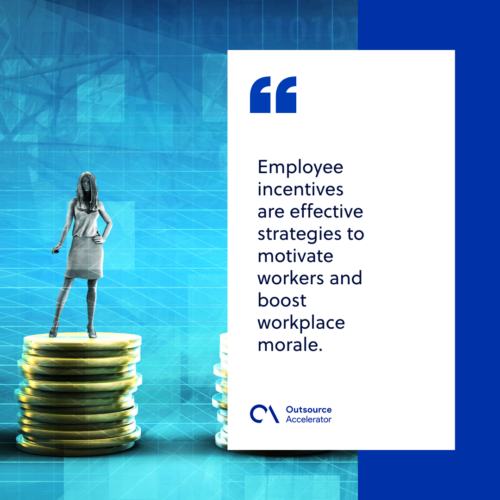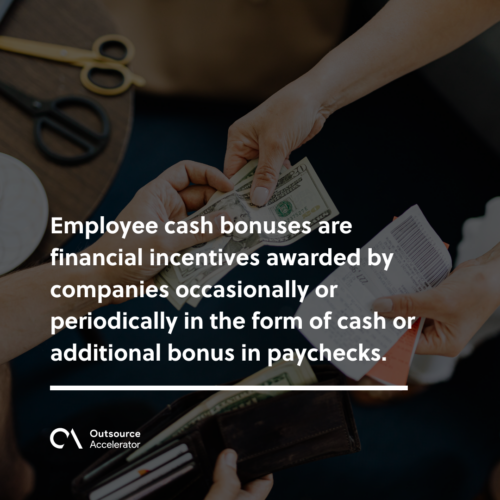Reward your employees’ hard work with monetary incentives

A business’s success is impossible without its employees’ hard work. Giving employees incentives is an excellent way of expressing recognition of their efforts and achievements.
Employee incentives are effective strategies to motivate workers and boost workplace morale. It also helps encourage productivity and show employee appreciation. There are two types of employee incentives: monetary and non-monetary incentives.
This article focuses on monetary incentives, their different kinds and advantages, and how businesses should provide them.

What is a monetary incentive?
Monetary incentives are the rewards employers give their workers depending on their performance assessments. Employers often hand out these incentives in the form of cash.
This type of reward falls under extrinsic incentive, which refers to motivation driven by external and tangible factors such as money.
Monetary incentives can come in different forms depending on an organization’s orientation.
It is up to the employers or HR personnel to decide which monetary compensation they should give deserving employees.
Types of monetary incentives
This section briefly discusses the various types of monetary incentives.
Salary raise
A salary raise is one of the most common monetary incentives to reflect an employee’s career advancement or exemplary performance.
This monetary compensation pertains to an employee’s increased salary based on performance. Promoted employees are often the recipients of salary increases.
This effective monetary incentive helps support and motivate a worker’s professional development. It is also an excellent strategy to help retain talented employees.
Salary raises are also known as wage incentives.
Cash bonuses
A cash bonus is another common type of monetary incentive. It refers to a lump sum of money added on top of the salary of an employee, a department, or the entire organization for reasons:
- Expressing appreciation for good performance or exceeding expectations on a task
- Showing recognition for marking important milestones like company anniversary
- Providing retention incentives
Employee cash bonuses are financial incentives awarded by companies occasionally or periodically in the form of cash or additional bonus in paychecks.
Well-known examples are the holiday or Christmas bonus and the 13th-month pay.

Allowances
When an employee or team is tasked to work on projects or other purposes that require a budget, the company will provide an allowance.
Employers commonly provide allowances for travel, technology, sales, and research.
Commissions or profit-sharing
Commissions or profit-sharing are the additional income employees earn through a percentage or share of profits.
The most common example is sales commissions. Sales commissions refer to the amount of money a sales personnel receives for successfully selling a product or service.
This form of monetary incentive can be a powerful motivator for employees to achieve their target sales and earn a share of company profits.
Referral incentives
Employee referral incentives encourage employees to find new applicants to work for their companies. When their organizations hire referred applicants, the referring employee is compensated financially.
Referral incentives are a win-win solution – companies grow and acquire new talents while employees earn monetary rewards.
Co-partnerships
Co-partnerships happen when two or more parties engage in a formal arrangement to have an equal share in the company’s profits and supervision in managing company operations.
This incentive does not necessarily grant firm ownership but is an excellent approach for supporting professional growth and employee success.
Retirement or pension benefits
Retirement or pension benefits are incentives for retired employees to guarantee economic security and a comfortable retirement.
Employers may provide their staff with retirement programs, including leave encashment and retirement gratuity. Another form is matching contributions, in which the employee and the employer make equal contributions to the employee’s retirement account.
Some retirement or pension benefits include funds for living costs, including childcare, healthcare, and college or educational expenses.

Employee stock options
This type of compensation allows employees to purchase shares of company stocks at a price often lower than the market offer for a specified period.
Though not directly in the form of cash, employees can convert their stocks for money after a while.
Pros and cons of monetary incentives
Employee monetary incentives can be a powerful performance motivator, especially when they are contingent on achieving specific goals.
Some employers prefer it over non-monetary incentives because it creates greater motivation and employee engagement, resulting in more productivity.
Monetary incentives also help employees better understand how their performance relates to the company’s overall objectives.
However, it’s important to remember that monetary rewards don’t always yield better results. They may do more harm than good and become a major employee turnoff when used without consideration.
Advantages of monetary incentives
Monetary compensation wouldn’t be one of the most commonly used motivators by employers if it weren’t effective.
Below are some of the benefits employers can reap from using financial rewards:
- Increases employee motivation
- Improves recruitment and retention
- Boosts productivity
- Encourages workers to perform better
- Fosters healthier working environments, such as reduced turnovers
Employers also benefit from the advantages of employee monetary incentive programs. Their companies have increased profits and become known as reputable workplaces that provide employee growth opportunities.
Disadvantages of monetary incentives
Monetary incentives are often seen as effective when used correctly. However, this type of employee compensation also has several disadvantages that must be considered.
For instance, employees may feel greater pressure to perform more than they usually do to earn the incentive.
Some might also not be the type to be motivated by monetary incentives because they prefer other options like time savings, better work-life balance, or flexible work schedules.
Some studies suggest that employee incentive programs are ineffective because:
- Some are not motivated by money
- Rewards may be viewed as punishments for being punitive and manipulative
- Possibly damages workplace relationships
- Indirectly or do not solve workplace problems
- Discourages risk-taking
- Undermines interest or intrinsic motivation for job performance
- Dangerous assumptions leading to harmful and illegal behavior (dishonesty)
Most employers also avoid practicing monetary incentive programs because it can lead to financial difficulties as it greatly impacts their net income.

Should you provide monetary incentives?
Offering monetary incentives may be a great thing, especially for generous employers. However, managers need to ask themselves first:
- Will this benefit both the employee and the company?
- Do the policies and practices necessary align to prevent discrimination?
Monetary incentive programs are a good employee engagement, recruitment, and retention strategy. However, employers must be thoughtful and thorough when making decisions for their incentive plans, like estimating if it fits within their company budget.
Before providing financial rewards, employers should also consider their business goals, such as sales increase and productivity. But be careful with offering too many options at a time as this may create more confusion for the employees.
When done correctly, these incentives can help the company’s image by making it a desirable workplace for present and potential employees.
As stated by the Human Resource Executive, incentive plans should reflect the organization’s values and undergo reevaluations to ensure it is serving its purpose.







 Independent
Independent




